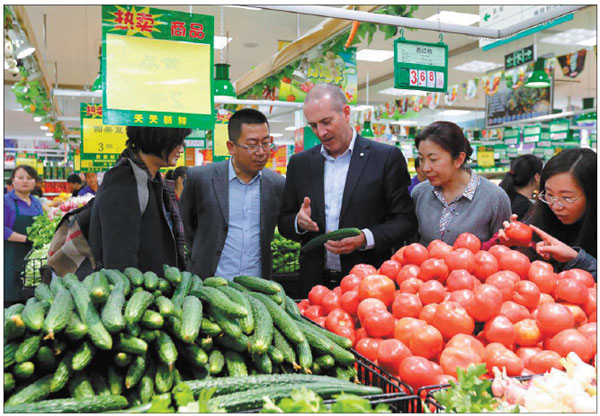Bayer helps grow higher quality, safe vegetables
Zhang Shunzhai, director of a vegetable-planting cooperative in Hebei province, was pleased with the crop solution offered by Bayer CropScience to plant high-quality and safe vegetables.
What impressed him most was the company's suggestion to prevent plant diseases in the first place, rather than simply treating them when it was often too late, said Zhang.
He said usually farmers use considerable chemicals to treat plants when they are ill.
"I think we had better change our traditional methods and try to prevent diseases by a minimal amount, much less than to treat the diseases."
Zhang started to use Bayer's method in his pilot fields and found it was effective to enhance plant health and also more cost-effective. That's when many other members of the cooperative began to be interested.
The Shunzhai Melons and Vegetables Planting Cooperative, where Zhang works, is in Gu'an county near Beijing and is a key vegetable supplier for the capital city.
The cooperative was set up in April 2007 by a couple of farmers including Zhang and today it covers 1,000 hectares and produces 50,000 tons of vegetables each year.
"We as producers were afraid that our products were unsafe and after cooperating with Bayer we are confident about the safety of our vegetables," said Zhang.
The cooperative began to use farm chemicals provided by Bayer in 2014. Zhang said that unlike other agrichemical makers, Bayer advocates responsible use of agrichemicals, especially in controlled dosage and in the ways to apply them.
The cooperative employed professionals and bought advanced equipment to examine the safety of its vegetables.
It sent statistics such as chemical residue levels to the agricultural administration in Langfang city, where the cooperative is located.
The quality examination center at the agricultural administration in Langfang checked the safety of the vegetables planted in the cooperative every week.
The amount of chemical residue left by Bayer's farm chemicals were less than those produced in the conventional ways, Zhang told China Daily.
"Bayer is committed to bring products of world-class safety standards to Chinese farmers," said Rob Hulme, country head of Bayer Crop-Science Greater China.
Shunzhai Cooperative's clients, who include Beijing Jingkelong Co, a daily consumer goods retailer, also examined the safety of the vegetables, according to Zhang.
Li Sheng, who is responsible for purchasing fresh commodities for the retailer, said the cooperation between Bayer and Shunzhai Cooperative gave Jingkelong more confidence in the quality of vegetables they were buying.
Jingkelong signed a 15-year deal with the cooperative in 2009 and buys 12,000 tons of vegetables each year from the cooperative as agreed.
In 2011, Jingkelong asked the cooperative to offer them 4,000 tons more a year.
Zhang said the cooperative plants vegetables based on client orders.
Beijing Xiabuxiabu Catering Management Co, known for its hotpot restaurants, is another client of the cooperative and receives 12 tons of leaf vegetables every day.
Bayer CorpScience, a subgroup of Bayer Group headquartered in Germany, signed a key account cooperation project with the cooperative on Oct 9 2014 to better help it produce high-quality and safe vegetables with higher yields.
The project focuses on crop protection, seed treatment and ecological technologies and targets Chinese agricultural enterprises with the aim to promote sustainable agricultural development.
"It's a great honor that Shunzhai Cooperative became Bayer's first partner in China within the key account project," said Zhang.
As well as safe crop protection products the company offered the cooperative highquality vegetable seeds and advanced practices for plant protection.
Zhang said in the past they failed to grow peppers because of diseases but after Bayer told them when and how to use disease prevention chemicals they started to grow the vegetable successfully.
Wang Zhixuan, chief of the vegetable bureau in Gu'an, said that cooperation between Bayer and the cooperative had a clear impact on promoting vegetable quality and reducing costs for farmers.
He said the vegetable bureau encouraged other vegetable planting organizations in the county to learn from how Bayer helped Shunzhai Cooperative plant vegetables in a safe and efficient way.
Gu'an has a population of about 400,000 people and about 80 percent of vegetables planted in the county are sold in Beijing, according to Wang.
"The Gu'an government values food safety and has set up 24 safety examination stations in main vegetable production areas in the county," Wang said.
In recent years an average of 30,000 hectares worth of vegetables is harvested each year in the county and the output value was about three billion yuan in 2014, said Wang.
There are more than 200 vegetable cooperatives in Gu'an and there are 20 that cover an area of at least 67 hectares.
songmengxing@chinadaily.com.cn
|
Bayer provides innovative and effi cient solutions to support the supply of green and safe vegetables to China. Photos Provided To China Daily |



















